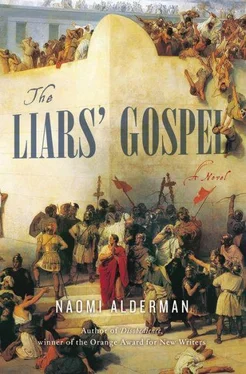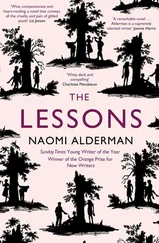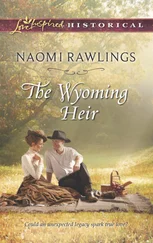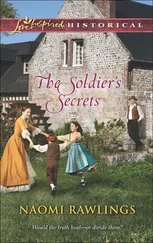Along the roads to Jerusalem, the Romans had erected wooden frames — two planks crossed, one over the other, a long upright and short crosspiece — making a shape like the letter zayin. There were thousands. They lined the road on either side as far as she could see, down the hill and curving around. And to each frame, they had nailed a man.
The day was warm. The sun was bright as if it knew not what it shone on. As if the Lord God Almighty, the Infinite One, He Who is Everywhere had forgotten this place.
There was the smell of blood. And the buzzing sound of flies. They gathered at the soft places — the ears, the nose, the eyes. And the beating wings and low tearing rip of the vultures and the crows. The blood had trickled down the frames, had pooled at the bases, had dried in brown drips. And there was the stench of rotting flesh, like a taste in her mouth. And there was the sound.
They walked along the rocky path. The men nearest the city had been nailed up first. They were already dead, their bodies contorted, their faces and flesh already eaten away by the carrion birds. As they went farther from the city, though, they came to the more recently captured rebels. These men had been there three days, four, five at most. It was they who were making the sound.
The soldiers, she knew, were still watching from the parapets of the walls of Jerusalem. No man could be cut down until the Prefect gave leave, and these men would rot here and the flesh would be eaten from their bones by the birds and the swarming things of the air. For all that, those who still had tongues in their heads pleaded for mercy, for a sponge to their brows or a swift sword to their throats. They cried for their mothers, she remembers. This was where she learned that all dying men call out for a mother. No matter what they said or thought before.
“Do not look up,” her father whispered to her, “do not stop, do not hesitate. Look down. Walk on.”
So she walked through the valley beshaded by the screaming trees.
This was the message of Rome to the people of Israel.
There are things which are too painful to think of. And she tries, she struggles constantly not to think of it. But she cannot make a day pass without remembering those men calling for their mothers. She knows what a man calls out when he is nailed to a crossbeam. She should have forced him to come home.
He sits on a rock a little way from her house. The wind brings news that summer will come soon.
She watches his sitting. This boy who is so very alive.
“Were you there,” she says, “in the uprising in Yaffo? Were you one of the rebels with the pretender king? Was your hand injured before you ever came here, injured in the fighting?”
He says, “I was there.”
“Following another master, Gidon? Another king of the Jews?”
He shrugs. Says what she has known to be true for a long time.
“They killed my family. My mother, my brothers, my father, my cousins and uncles. For a long time I followed anyone who promised to destroy them.”
She nods. They are silent for a long while.
“I am different now,” he says. “I did not lie that God told me to seek you out. It was after the rising in Yaffo, after we had been defeated, I was sleeping in the mountains waiting for spring and in a dream a voice as clear as a sword told me to come and find you.”
She believes him.
“You cannot stay here now.”
He nods.
“I’ll leave tomorrow.”
“No,” she says, “too soon will raise suspicion. Wait another week or two. Start traveling with the early pilgrims for the next festival.”
He nods again.
She sits next to him, on the rock. The place is warm where the sun has been. A lizard is heating its blood an arm’s length away from them on another flat stone. She can feel his body next to hers as if they were touching. She sighs. He places his hand over hers. He clasps her hand. His thumb moves, feeling her fingers, absorbing them. She does not know whether he even sees her any longer or simply the man he hopes to reach through her. But he is so soft with her that her heart cracks open, she cannot help it.
She says, quietly, “You believe what you told me? You hold it in your heart?”
He says, “I do.”
She says, “Then my son Yehoshuah lives in your heart.”
He says, “And in the heart of all who believe it.”
She nods. That is where the dead live. In the heart.
He begins to hum a little melody. It is the melody the goat herders often sing when they are moving the brindled flock to summer pastures. She joins in, letting her voice run alongside his, sometimes choosing the notes which harmonize, sometimes singing the same tune. It feels as though they are one person, singing like this.
And she will not, she will not. Her son is dead, he is gone, but when she closes her eyes she can believe that he is here now, that he has come back to her in the long notes and the tune and the piping warble at the back of the throat. He has not let go of her hand. He is so young, younger than her son was when she saw him last. His skin is soft, his hands uncalloused. She does not want to be moved but she cannot help herself. She is swept away.
The song ends. He looks at her, those eyes so full of longing. She knows what he wants from her, this young and beautiful man.
She says, “Shall I tell you a story?”
He sits perfectly calm, with those shining eyes.
“It is a story from long ago,” she says, “when I first became pregnant with my child Yehoshuah.”
She sees him mutter something under his breath as she says her son’s name.
“Now I think of it,” she says, and her voice has taken on the singsong quality of a child’s storyteller, “now that I think of it, there were signs that his birth would be special.” A chaffinch begins to sing in the thorn tree; a song of joy that the winter has, at last, receded. “There were birds,” she says, “the birds seemed to follow me wherever I went, singing to the child in my womb. And once, there was a stranger…”
She pauses. Anyone who has read the Torah knows what a stranger is. A stranger could be anyone. A stranger could be the angel of the Lord come with a test of kindness or hospitality, and if you passed that test the angel might bless you. A stranger could be the Lord walking among you.
“There was a stranger in the village who saw my belly swollen with the child and began suddenly to speak, saying, ‘Blessed are you, and blessed is that child whom you carry within you!’”
She continues to tell this story. She thinks of how all the stories she has ever heard must have come to be. There are only three ways: either they were true, or someone was mistaken, or someone lied. She knows that the story she is telling is a lie, but she says it anyway. Not in fear, and not in anger, and not even in hope of anything that is to come, but because it brings her comfort to see that he believes it. Even such a simple, foolish thing as this. It brings her son back here, for a moment, back to her side and his small head under her hand and his life again unfolding. It is too good a gift to turn down, this opportunity to return him to life. And she knows it is a sin, and that God holds special punishments in store for such sins, but she cannot imagine worse than she has already seen.
She had been in Jerusalem that last spring. After he was gone, after the first day of Passover, which is sacred and on which no work can be done, she heard that he had not hung long on that wooden frame. Her son, Yirmiyahu, brought her the news. One of Yehoshuah’s friends, a wealthy man, had bribed the guards and taken him down and placed him in a tomb.
She thought on it for a day and a night. She remembered what he had said: they were not his family. They were not the ones he had called for, they were not the ones he had spent his last days with. But was it possible that he had died without thinking of her? He had no wife to mourn for him or children to carry on his name. If he had belonged to these friends in life, perhaps he was his family’s again in death.
Читать дальше












